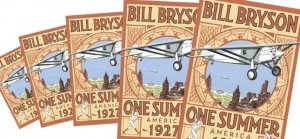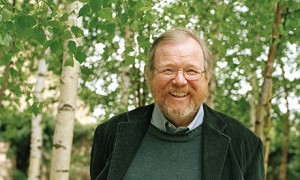One Summer:
America 1927

Now, anyone who knows me will confirm that I’m a technophobe. It’s not something to boast about, it’s just a plain fact. Granted, given the job I do I have to have some basic knowledge of a computer; but really complicated workings—you know, things like scanning or sending a photograph—remain part of my 2014 New Year learn-to-do resolutions. With my mobile phone I know how to receive and to make calls. Oh, and I’m really proud of my new skill at setting the alarm.
All things considered I’d probably be happier if we still used a quill and inkpot. As an extension of this I’ve always been fascinated by the era of the silent movie. It’s one of life’s cruel kick in the ghoulies that they were only hitting an artistic high when ‘talking movies’ came along. And this week, courtesy of Bill Bryson’s new book, One Summer, I have another reason to hate the advent of talkies. It seems that they were responsible in part for American world domination:
“Movie goers around the world suddenly found themselves exposed, often for the first time, to American voices, American vocabulary, American cadence and pronunciation and word order. Spanish conquistadores, Elizabethan courtiers, figures from the Bible were suddenly speaking in American voices—and not just occasionally but in film after film after film. The psychological effect of this, particularly on the young, can hardly be overstated. With American speech came American thought, American attitudes, American sense of humour and American sensibilities. Peacefully, by accident, and almost unnoticed, America had just taken over the world.”
You know, I hadn’t thought of it like that.
Henry in Fordlandia
One of the many, many things that I like about Bill Bryson’s writing is that you are as comfortable with him as you are sitting on a bar stool in your local with a cold pint in front of you. He’ll start off with one anecdote and suddenly segue seamlessly into another, perhaps only related to the first in the loosest way. Yet he’s never tedious. This isn’t the Barstool Philosopher—and every pub has one—who will bore you into catatonia with his relentless drivel if you haven’t already ran screaming from the place, glass still clutched tightly in your sweaty little paw. Bryson is always interesting.
And his new tome One Summer: America 1927 is just fascinating. It’s not ‘going-to-change-your-life’ fascinating, but it will have you coming across facts about people that you vaguely pictured as sane and then wonder where you got that idea from.
Take Henry Ford, for example. Now if I had ever given much thought to Henry Ford before, it was probably along the lines of: Brilliant guy, made these really affordable cars back in the twenties. Had a thing about the colour black. It almost certainly wouldn’t have been along the lines of: Total anti-Semite who had the hilarious plan of doing a Fitzcarraldo and building a town in the South American jungle called Fordlandia where everyone would have a Model T but nowhere to drive it to.
This all seems to have come about because Ford was damned if he was going to be dependent on rubber suppliers when he could just build himself a whole town across two and a half million acres of rainforest and which would hopefully become the biggest rubber-producing estate in the world. In theory, it was dodgy enough, but in practice he despatched…
“…a 37-year-old junior manager named Willis Blakely. Blakely’s instructions were precise and vastly beyond his capabilities. He was to build a complete town with a central square, business district, hospital, cinema, ballroom, golf course and other useful and fulfilling municipal enterprises… the clocks would be set to Michigan time and Prohibition would be observed, even though it was not the law of Brazil. Whatever the cost, Fordlandia would be dedicated to American laws, culture and values—an outpost of Protestant ideals in the middle of a hot, godless jungle.”
Unfortunately Ford had sent in someone who was not only completely incompetent, a total pisshead and who delighted in getting on the nerves of the locals into the bargain. Nor were his subsequent choices much better. Today you can find on the Web dozens of photographs of sad, forgotten Fordlandia deserted and despondent in the Brazilian sun.
I love strange facts like that. And as Bryson cheerily guides us through the memorable months of May through September of 1927 he gives us literally hundreds of them.
He builds what could have been a hodgepodge of unrelated incidents around several central events, managing to make an enjoyable and comprehensive whole out of his material. Some of it I didn’t find all that interesting. Obviously, not being a baseball fan, the career of Babe Ruth would be one (although even here Bryson managed to keep me reading). I didn’t think that I would be overly interested in Charles Lindbergh, the first man to fly solo across the Atlantic and another truly outrageous anti-Semite. In Bryson’s hands, though, you just sit back and let him take you where he will.
Premonitions of a Master Race
Who would have thought that two inept murderers in the forms of Ruth Snyder and Judd Gray the corset salesman would be executed but find a kind of immortality in film and literary culture by morphing into the duplicitous pair in The Postman Always Rings Twice and Double Indemnity?
There was also an unexpected pleasure in Bryson’s book as, completely by coincidence, I was reading it concurrent with watching the brilliant Season Four of Boardwalk Empire. It really added to both that the same names kept cropping up, especially Al Capone. And here’s another fact that has you smiling at Life’s sense of humour:
“Al was the Capones’ fourth son, and the first one born in America. His eldest brother, Vincenzo, ran away to the west in 1908 at the age of sixteen. The Capones got one letter from him the following year, from Kansas, then heard nothing more from him ever again. In fact, Vincenzo had become a Prohibition agent [!] known as Richard ‘Two Gun’ Hart. He had named himself after the cowboy star William S. Hart, and dressed like him, too, in outsized Stetson, with a tin star on his breast and a pair of loaded holsters around his waist.”
It’s part of Bill Bryson’s style to get his information across to you whilst keeping things light and breezy; which makes it all the more of a shock when we hear just how seriously a lot of Americans took the ‘social philosophy’ of eugenics during the early part of the 20th century. It’s a particular surprise for those of us who mainly associate it with Nazi Germany.
“Since early in the century, a large number of prominent and learned Americans had been preoccupied, often to the point of obsessiveness, with the belief that the country was filling up with dangerously inferior people and that something urgent must be done about it.
“Dr. William Robinson, a leading New York physician, spoke for a vociferous minority when he declared that people of an inferior nature ‘have no right in the first instance to be born, but having been born, they have no right to propagate their kind’. W. Duncan McKim, also a physician and author of Heredity and Human Progress, proposed that ‘the surest, the simplest, the kindest, and most humane means for preventing reproduction among those whom we deem unworthy of the high privilege, is a gentle, painless death.’”
I’m not sure if Bryson’s definition of ‘eugenics ‘ is his own but it seems as good as any and just as terrifying: the scientific cultivation of superior beings. Of course, it has an almost noble ring to it; but we all know by now that ultimately it was to lead to the rancid smoke pouring forth from the concentration camps.
One Summer is a terrific, nostalgic read as well as a wonderful opportunity to spend some time in an America long-since vanished.


Recent Comments